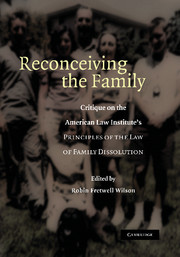 Reconceiving the Family
Reconceiving the Family Book contents
- Frontmatter
- Contents
- Acknowledgments
- Foreword, by Mary Ann Glendon
- List of Contributors
- Introduction
- PART ONE FAULT
- PART TWO CUSTODY
- PART THREE CHILD SUPPORT
- PART FOUR PROPERTY DIVISION
- PART FIVE SPOUSAL SUPPORT
- PART SIX DOMESTIC PARTNERSHIP
- PART SEVEN AGREEMENTS
- PART EIGHT JUDICIAL AND LEGISLATIVE PERSPECTIVES
- PART NINE INTERNATIONAL REFLECTIONS
- Afterword: Elite Principles: The ALI Proposals and the Politics of Law Reform, by Carl E. Schneider
- Index
Introduction
Published online by Cambridge University Press: 25 January 2010
- Frontmatter
- Contents
- Acknowledgments
- Foreword, by Mary Ann Glendon
- List of Contributors
- Introduction
- PART ONE FAULT
- PART TWO CUSTODY
- PART THREE CHILD SUPPORT
- PART FOUR PROPERTY DIVISION
- PART FIVE SPOUSAL SUPPORT
- PART SIX DOMESTIC PARTNERSHIP
- PART SEVEN AGREEMENTS
- PART EIGHT JUDICIAL AND LEGISLATIVE PERSPECTIVES
- PART NINE INTERNATIONAL REFLECTIONS
- Afterword: Elite Principles: The ALI Proposals and the Politics of Law Reform, by Carl E. Schneider
- Index
Summary
The family has undergone almost revolutionary reconfigurations over the past generation. In the space of a few decades, we have seen the universal recognition in the United States of no-fault divorce, the legal recognition of nonmarital fathers, the establishment of registration schemes and other claims between cohabitants, both heterosexual and homosexual, and the recognition as parents of adults who have neither a biological tie to a child nor an adoptive one. Recently, the pace of these changes has become almost frenetic. Just this year, Canada legalized same-sex marriage through national legislation, as South Africa did by judicial opinion; New Zealand's Law Commission has recommended major changes to the legal rules that determine status as a parent so that certain egg or sperm donors could become a child's third parent; and Belgium formally recognized its first polygamous marriage.
Family law is red hot. These subjects – divorce, cohabitation, same-sex relationships, and the nature of parenting and parenthood – are now the subject of intense public debate in newspaper articles, editorials, television talk shows, and legislation, at the federal, state, and local levels.
In this volume, you will find the first major critique of the intellectually formidable and influential Principles of the law of family dissolution: analysis and recommendations (“Principles”) developed by the American Law Institute (“ALI”) over an eleven-year period, ending in 2002. In the Principles, the ALI carefully considers many of the significant and very controversial questions raised by these changing family forms.
- Type
- Chapter
- Information
- Reconceiving the FamilyCritique on the American Law Institute's Principles of the Law of Family Dissolution, pp. 1 - 8Publisher: Cambridge University PressPrint publication year: 2006
